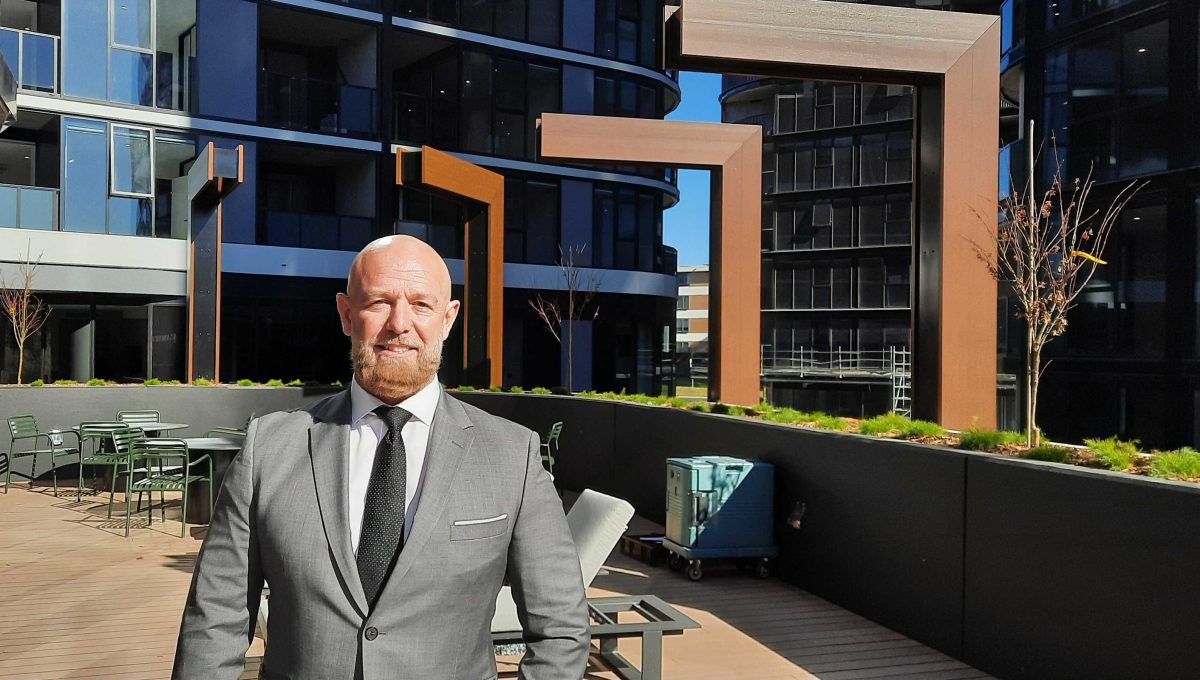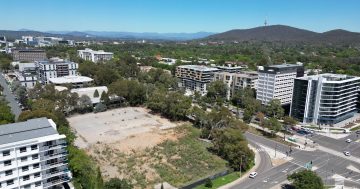
Geocon founder and Managing Director Nick Georgalis at the new WOVA development in Woden. Labour shortages are here to stay, he says. Photo: Ian Bushnell.
The ACT’s biggest developer and builder has come out against cutting migration in response to the housing crisis.
Opposition Leader Peter Dutton has been outspoken about the need to cut back on the number of migrants Australia has been taking to help ease pressure on housing, but the Federal Government is also trimming immigration after the post-pandemic spike.
However, Geocon Managing Director Nick Georgalis said the building industry was beset by challenges, including labour shortages.
“We’ve probably found the new norm today where the labour shortages that we have aren’t going to get resolved, particularly when you see the Federal Government talking about cutting migration,” he said.
“That’s not the solution to the housing crisis.”
It was Mr Georgalis who warned in 2021 when breaking ground on the just-completed massive four-building WOVA apartment and hotel development in Woden that the ACT faced a housing crisis.
Mr Georgalis said his prediction was taken as something that a property developer would say, but he was right.
“We saw the writing on the wall four years ago when we said there’s a housing crisis, and everyone said that we had a vested interest in that, but it was very clear and evident to us that the housing crisis was coming,” he said.
“It was actually 2019 that we came out initially and saw it, and all that happened was COVID multiplied that.”
Mr Georgalis said he did not see a solution to the housing crisis in the next 10 years.
“Not in the current climate,” he said.
Mr Georgalis said that commencements in the ACT had fallen away and there were very few new projects this year.
Although he didn’t want to criticise governments, Mr Georgalis believed they could do more to release land, reduce planning complexities and speed up approvals.
He also believed that licensing would only add to the risk developers bear and deter some from taking on developments.
While licensing would not impact Geocon as much as other businesses because it was an integrated developer/builder, others would have to weigh several commercial factors.
“If anything, I certainly think it’s going to put more pressure on the housing market because it will certainly have an impact on people’s decision-making,” Mr Georgalis said.
He added that it was a very challenging time for the industry, and not all companies had the scale to survive the COVID shutdowns, delays, shortages and increased costs.
He said that meant a smaller market, fewer companies and fewer resources to deliver more housing.
Those that had survived would be the stronger for it, and consumers would benefit.
Mr Georgalis said Geocon had spent years refining its processes, systems and training to deal with what had happened in the market in recent times.
“We’ve absorbed the cost increases, but I think the important thing to note is that we stick by a brand and certainly make sure that when someone does purchase a property off us, they do get handed over that property,” he said.
Mr Georgalis hoped that the industry was at the tail end of the shake-out that had resulted in the demise of respected and reputable companies.
“But I really don’t know. We’re very focused internally on what we do and how we deliver things,” he said.
“We know what we have for the next few years and we’ll keep growing that pipeline and keep focusing on our consumers.”





















